#Natasja Crone Back
Explore tagged Tumblr posts
Text
Copenhagen 2001
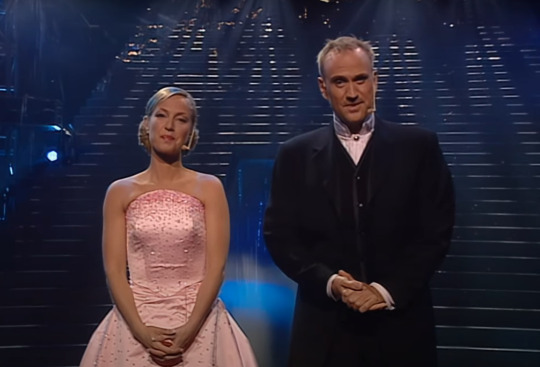
I was contemplating writing this in rhyming couplets, but you don't deserve that.
Anything Stockholm can do, Copenhagen can do bigger. Welcome to Parken Stadium - yes, the national football stadium - and 38,000(!) Eurofans who are securely housed under the newly installed retractable roof. A feature specifically added to the stadium for Eurovision. This year the acts will be performing in front of the biggest crowd ever with seats all over the pitch and the stands full.
The stage is huge and relatively dark making some of the acts appear somewhat small and lost, but just wow, Eurovision is officially huge.
The rules haven't changed at all this year, and that means relegation for a record seven countries as more and more nations apply to participate. Austria, Belgium, Cyprus, Switzerland, Romania, North Macedonia and Finland take a year out while Bosnia & Herzegovina, Greece, Slovenia, Portugal, Poland and Lithuania all return. With Latvia staying, this is first year that all three Baltic nations have competed in the same Eurovision. France and Spain were in the relegation zone, but were saved thanks to their big four status. Austria and Belgium were the unlucky countries to make way for them.
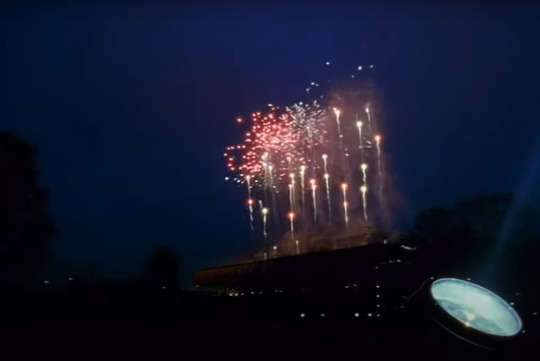
The voting this year is again 100% televotes, except where it isn't with three countries (Bosnia & Herzegovina, Russia and Türkiye) using juries and three (Croatia, Malta and Greece) having a 50/50 televote/jury mix determining their points. This is the first year in which the EBU experiment with that mix - and it'll make my televoting analysis for the year more complicated and perhaps more interesting.
This year's intro takes place live, outside the stadium and we're treated to some fireworks in what appears to be a foggy Copenhagen evening. There are no establishing shots, we're straight inside the stadium and on with the show.
Well nearly, there's quite a bit of doggerel first - with the hosts performing the entire evening in rhymes many of which are a little, well, forced.
Those hosts aren't Doctor Death and the Tooth Fairy, thank you very much Terry Wogan. They are actor Søren Pilmark and TV presenter Natasja Crone Back.
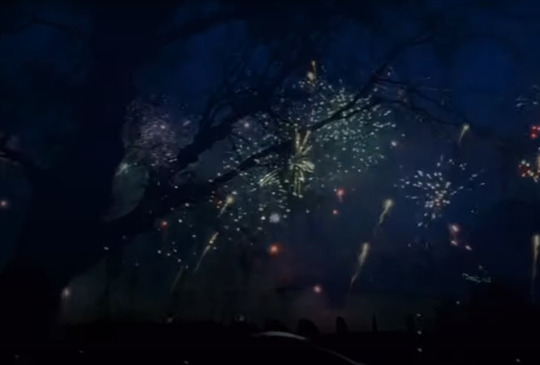
#esc#esc 2001#eurovision#eurovision song contest#copenhagen#copenhagen 2001#Denmark#Parken Stadium#Søren Pilmark#Natasja Crone Back
3 notes
·
View notes
Text
Eurovision Fact #210:
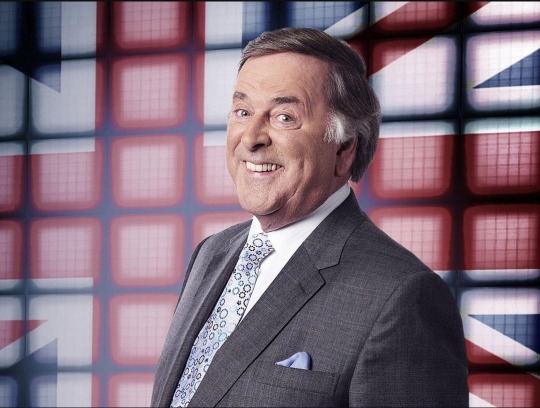
The hosts for the 2001 contest, Natasja Crone Back and Søren Pilmark, spoke entirely in rhyming couplets!
Terry Wogan, commentator for the UK, mocked and ridiculed this choice heavily. He called the announcers Dr. Death and The Tooth Fairy.
After complaints from the Danish broadcaster to the BBC, however, the BBC apologized oh his behalf.
[Sources]:
Copenhagen 2001, Eurovision.tv.
'Wogan i hardt vær,' nrk.no.
Eurovision 2001, Wikipedia.com.
#esc facts oc#esc#eurovision#eurovision song contest#eurovision facts oc#esc 2001#terry wogan#Natasja Crone Back#Søren Pilmark
4 notes
·
View notes
Photo

14 notes
·
View notes
Text







Eurovision Song Contest 2001
The 46th edition of the Eurovision Song Contest took place on the 12th of May of 2001 in the Parken Stadium, Copenhagen, after the victory of the Olsen Brothers the year before with the song Fly On The Wings Of Love. The show was hosted by Natasja Crone Back and Søren Pilmark who spoke almost entirely in rhyming couplets.
At the end of the contest Everybody by Tanel Padar, Dave Benton & 2XL was crowned the winner with 198 points, Estonia's first victory in Eurovision
[watch the show]
#eurovision#eurovision 2001#esc#esc 2001#2001#gif#00s#op#I'm linking to a show with german commentary#there's one with slighlty better quality of video but it's the bbc one and I'm not subjecting any of you to terry wogan#{year}
16 notes
·
View notes
Text
Copenhagen 2001
Host: Denmark Participants: 23 Voting method: 12-point system (mostly televotes) Format: Relegation – the 12 highest average scores between 1996-2000 + Big 4/Host + the 6 relegated in '00 incl. Greece Winner: Tanel Padar, Dave Benton & 2XL - Everybody Country: Estonia Language: English Points: 198 (75.0% of highest score possible)
General Overview: Copenhagen upgrades the Eurovision Song Contest from an arena to a stadium. The capacity was 38,000; more than doubling Stockholm's record from the previous year. This large venue (a football stadium) included a retractable roof, which essentially turned the contest into an outdoor concert. This ultimately proved to be a mistake, however. A significant portion of the attendees could not see the stage. And Eurovision just feels weird in a stadium like this. Indeed, no host country has ever done this again.
The 2001 contest is known for being one of the worst. Or at least, one of the most forgettable. There's so many weird and underwhelming entries. Novelty entries can be fun, but they also hurt Eurovision's reputation, feeding into the negative stereotypes. Which is the issue that the 2000s is going to have. Most of the high rankers are slotted in the second half as well. In fact, the top 3 are within the final 4 songs. And, percentage-wise, the final results are quite top-heavy, which often indicates a weak contest.
There is no opening video this time - instead, the Olsen Brothers perform immediately, accompanied by a fireworks display. They sing "Fly on the Wings of Love" and "Walk Right Back". The postcards are generic. And the presenters are Natasja Crone Back & Søren Pilmark, who speak almost exclusively in rhyming couplets for the whole show. The latter also “accidentally” shatters the trophy and performs a magic trick. I enjoy comedic hosts, but these two are a bit much.
The 2001 contest contains one of the more notable interval acts – the Aqua medley. It also features Safri Duo on drums. The set list includes “Around The World”, “Barbie Girl”, “Turn Back Time”, “Roses Are Red”, “My Oh My”, “Lollipop (Candyman)”, “Doctor Jones” and “Cartoon Heroes”. This evokes nostalgia of my childhood. But having said that, the group looks like they don't give two s**ts. There’s swearing, sexual gestures, and I'm 90% sure it's all lip synced.
Greece returns after a two-year absence, and attains their best result to date. Coincidentally, there's two separate artists under the mononym Michelle (Netherlands and Germany), and two separate songs titled “[Out] On My Own” (Netherlands and Norway).
The audience is noticeably reactive during the vote reveal since Denmark was in contention to win consecutively. They were even leading at the halfway point. The gap between Denmark and Estonia was deceptively close, however, since Denmark voted last, and they couldn't vote for themselves.
Netherlands: Michelle - Out On My Own The first entry of 2001 aptly involves unconventional staging. Michelle and the backing singers spend the first ~2 minutes sitting on the floor, before standing up towards the end. It symbolizes Michelle's rise to freedom. The song is a stagnantly arranged ballad that's borderline a cappella with how bare the instrumental is. It doesn't build to anything. The lyrics describe “leaving the nest” and the new freedoms of adulthood.
Iceland: Two Tricky - Angel The “death slot” sends Iceland into joint-last place with Norway. “Angel” is pleasant, inoffensive, unassuming radio fodder or background music. The lyrics aren't anything special either. But it's also a calming and charming vibe, and the melody does stick. I just wish the song was less bland, because it's a pretty likeable song.
Bosnia & Herzegovina: Nino Pršeš - Hano The Bosnian entry involves an “ethnic” beat and a lackadaisical demeanour from Nino. He tries to look “cool”, with the sunglasses, the leaning poses, and the jailbird orange outfit. But the presentation is effectively mysterious. The song is directed at “Hano”, who won't reciprocate Nino's feelings. The lyrics are quite bitter. It's one of the more intriguing entries this year. Although Nino isn’t the best vocalist.
Norway: Haldor Lægreid - On My Own Norway are tied with Iceland for last place. The arrangement emulates the upcoming Idol/X Factor ballad template. Indeed, Haldor belts some big notes towards the end. Overall though, the song is slow and tedious and the chorus is lacking. And Haldor's performance feels emotionless. Lyrically, he resumes his life path after being held back.
Israel: Tal Sondak - En Davar “En Davar” is a formulaic Israeli entry. There's a charming performer, a meticulously planned out choreo routine, a danceable rhythm, and the instrumentation channels Eastern elements. The shouting chorus is certainly catchy but the song doesn't do anything original with the formula. It's tiresome. Lyrically, Tal uses this song to erase his lover's sadness. But he comes off rather smarmy.
Russia: Mumiy Troll - Lady Alpine Blue Here comes the weird entries. The Russian band lives up to their name – “Lady Alpine Blue” is a troll entry. The purposefully unappealing kind that gives Eurovision a bad reputation. Mumiy Troll channel Latvia's eccentricity from 2000, but the lead singer's facial expressions and vocal style are just creepy. The lyrics are nonsensical too.
Sweden: Friends - Listen to Your Heartbeat “Listen To Your Heartbeat” was accused of plagiarizing Belgium's 1996 entry... to the point where the songwriters pursued legal action. The song was ultimately approved once matters were resolved outside of court. Also of note, “Heartbeat” is the first appearance of composer Thomas G:son; near the beginning of his bloated national final discography. So, Sweden channels ABBA again. The piano notes are reminiscent of “The Winner Takes It All”. The song contains a catchy pop melody, but it just screams safe. The song is basic, but that's an excusable flaw in 2001. It's well-staged though - with the red outfits and the body movements. But the song is similar to Sweden's winner from just 2 years ago.
Lithuania: SKAMP - You Got Style This is such a weird and messy entry. “You Got Style” employs a flirtatious, strutting disco groove, while Erica sings in a casual style, and Viktoras raps a verse in Lithuanian. The song's premise involves Erica and Viktoras checking each other out in/on the club/street. It's a fun concept and the song has a chill rhythm. But Erica's vocal style is too offbeat; it's like she's singing the wrong melody. Plus the clothing choices on stage are typical early 2000s ESC goofiness, including colourful afros and plaid pants on the backing.
Latvia: Arnis Mednis - Too Much Time for the next weird/joke entry. Hard pass to whatever this is. “Too Much” is a prime example of what was wrong with Eurovision around this time. It’s unappealingly tacky with the genre switches and Arnis’s annoying singing style. The premise is also silly. Arnis is about to get married, so he parties with other girls the night before the wedding, but then his wife finds out. So now he's in deep trouble. It's a self-deprecating song, but I don't find it particularly funny.
Croatia: Vanna - Strings of My Heart The Croatian entry encompasses intricate production, with a pounding dance beat and prominent strings. Vanna exudes splendid vocals. But the arrangement is monotonous... it's essentially a 3-minute long chorus. Still, it's brilliant compared to the rest of 2001.
Portugal: MTM - Só sei ser feliz assim This... exists. There's not much to say about the Portuguese entry. The song is a nonentity. The performance is amateur. The duo are dressed in suits, they sway a lot, and the lyrics are lovey-dovey. It's meant to be a feelgood song but it's just “there”.
Ireland: Gary O'Shaughnessy - Without Your Love This instrumental is straight out of 1991. Yeesh. This is Ireland's worst result since debuting. In 21st place, that's low enough to be relegated from 2002, so it's safe to say Ireland's dominance over the contest has passed. “Without Your Love” is another formulaic Irish ballad. The heartbreak lyrics are uninspired and the whole thing is just overdone.
Spain: David Civera - Dile que la quiero Spain returns to the top 6 following a few misfires. “Dile” contains a Spanish dance rhythm, while David emulates Ricky Martin. He delivers energy and confidence on stage, while his animated dance moves and beaming smile are cute. The song has a harmless groove that's easy to enjoy.
France: Natasha St-Pier - Je n'ai que mon âme Likewise, France returns to the top 4 after a few rough years. In 2001, they select an artist born in the Canadian province of New Brunswick, which is right next door to where I'm from. “Je n'ai que mon âme” is a straightforward vocal ballad, harking back to the French ballad era of Eurovision. The Celine Dion comparisons are obvious. Natasha delivers a classy performance, though, and the lyrics are mature. It's a predictable arrangement, but it's done well, and it reaches an "epic" climax. It's really refreshing in a year like this.
Turkey: Sedat Yüce - Sevgiliye Son Ireland aren't the only ones stuck in the past this year. This Turkish entry assumes that Eurovision is still in its orchestral ballad era. “Sevgiliye Son” shifts between bombastic climaxes and subdued breathers. It's sufficiently melodramatic for a song about pained longing, though. Sedat's vocals, meanwhile, are smooth. The arrangement is compelling enough, but the song is kinda tedious.
United Kingdom: Lindsay Dracass - No Dream Impossible The UK entry attempts a fresh idea here, but the execution is a disaster. “No Dream Impossible” is a cliche, inspirational pop song that employs a trance beat. There’s also a shoehorned rap bridge that doesn’t fit in at all. Lindsay's image, meanwhile, resembles someone who just came from the gym. She looks disengaged and her vocals are all over the place.
Slovenia: Nuša Derenda - Energy Slovenia serves a contemporary, electrifying club banger. The ominous, buzzing voltage sounds are thrilling. It encapsulates the euphoria Nuša feels from this elusive person. In the performance, she supplies fierce stage presence. And the bridge is epic – with the vigorous piano notes, the backing dancers lifting Nuša up, and the thunderous transition into the final chorus. The lighting is smart too.
Poland: Piasek - 2 Long Another forgettable entry. “2 Long” is light and breezy, and the gospel choir is uplifting. Piasek wants to mend the relationship he screwed up. He has a casual approach to the matter. The staging isn't remarkable either, aside from when Piasek ditches his fur coat. The chorus is catchy enough though.
Germany: Michelle - Wer Liebe lebt The fourth consecutive top 10 placing for Germany. “Wer Liebe lebt” is a standard vocal ballad. The song has a predictable arrangement, but it's well-sung and Michelle looks classy in that stunning dress. While the lyrics are poetically dreamy; describing the power of love. France's ballad is more compelling, though. I find this chorus kinda annoying.
Estonia: Tanel Padar, Dave Benton & 2XL - Everybody (winner review below)
Malta: Fabrizio Faniello - Another Summer Night Malta hops on the Latin pop trend of the early 2000's. The performance is similar to Spain's, where Fabrizio is a sexy male show-off. This time with hip shakes. There's a summery beach romance vibe and the guitar responses are a highlight. But his vocals aren't the most appealing and the live performance is kinda flat.
Greece: Antique - (I Would) Die for You Possibly the best Greek entry ever? By landing in 3rd place, this was Greece's best result in the contest so far. This is also Helena Paparizou's first appearance, as she is the lead singer of Antique. “Die For You” is a euphoric, haunting song that's lead by a bouzouki and employs a contemporary rattling dance beat. That bouzouki sets the mood perfectly. The chorus melody hits hard. The “No one else could ever love you like the way I do” part is like an entrancing plunge. And Helena breathes stage presence.
Denmark: Rollo & King - Never Ever Let You Go The host entry is the runner-up yet again. Honestly, this is better than “Fly on the Wings of Love”. “Never Ever Let You Go” is a feelgood, harmonica-lead, folksy jubilee. The overall arrangement flows and floats effortlessly. And that harmonica provides the song with distinct character. It's a cute duet, where the pair radiates warmth on stage as they express their irresistible feelings of each other.
The Winner: Estonia is the first virgin winner since Yugoslavia 1989, which was 12 years prior. Interestingly, 2001 starts a run of 8 consecutive first-time winners (from Estonia '01 to Russia '08) – many of which are Eastern European countries. The 2000's witnessed a shift in that regard; where the newer participants attained better results, in general, than the longstanding Western ones.
So 2001 provides, arguably, the most forgettable winner of the 21st century. “Everybody” illustrates a drunk karaoke night at the pub. It's a disco party song that invites the audience to join in. Which is perfect for a crowd this size. The duet admittedly brings energy to the stage, although Tanel's smirks and frisky dance moves verge on smug cockiness. Even moreso in his reaction to winning.
The pairing of Tanel Padar and Dave Benton sees two different generations and races bond. Incidentally, Dave is the oldest person to win Eurovision at 50. (The other credited artist – 2XL – are the backing singers). The duo's friendship is convincing on stage. The song establishes a call-and-response routine, where Dave commentates on Tanel's lines by roasting him. It's what close friends do, but it's so dumb to hear it in song form. Dave directs lines such as “All right - You give it to them now”, “I guess this is party time”, “Young and handsome, they say”, and “He's goin' for a ride now” towards Tanel... and it's all a bit cringe. I can appreciate laid back vibes, but “Everybody” treads too closely to being a joke entry. And I do not want joke entries winning Eurovision (more on that in 2002). That said, the “come on everybody” refrain is catchy.
Winner rank: “C” Tier, not that great of a winner... but still enough to be #11 of this year.
My Ranking: 01. Greece: Antique - (I Would) Die for You 02. Slovenia: Nuša Derenda - Energy 03. France: Natasha St-Pier - Je n'ai que mon âme 04. Denmark: Rollo & King - Never Ever Let You Go 05. Spain: David Civera - Dile que la quiero 06. Bosnia & Herzegovina: Nino Pršeš - Hano 07. Iceland: Two Tricky - Angel 08. Croatia: Vanna - Strings of My Heart 09. Lithuania: SKAMP - You Got Style 10. Sweden: Friends - Listen to Your Heartbeat 11. Estonia: Tanel Padar, Dave Benton & 2XL - Everybody 12. Netherlands: Michelle - Out on My Own 13. Poland: Piasek - 2 Long 14. Germany: Michelle - Wer Liebe lebt 15. Malta: Fabrizio Faniello - Another Summer Night 16. Turkey: Sedat Yüce - Sevgiliye Son 17. Israel: Tal Sondak - En Davar 18. United Kingdom: Lindsay Dracass - No Dream Impossible 19. Ireland: Gary O'Shaughnessy - Without Your Love 20. Norway: Haldor Lægreid - On My Own 21. Portugal: MTM - Só sei ser feliz assim 22. Russia: Mumiy Troll - Lady Alpine Blue 23. Latvia: Arnis Mednis - Too Much
0 notes
Text
Copenhagen 2001 - The interval act and other performances
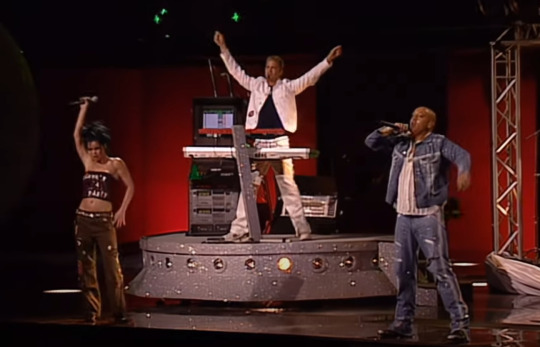
Only two musical extras this year - first last year's winners, The Olsen Brothers kick things off with a reprise of 2000's winning song Fly on the Wings of Love, segueing neatly into their new song Walk Right Back accompanied by four be-tartaned female pipers.
The opening song by last year's winner has been done before, but in 2001 it feels as if this performance establishes it firmly in the schedule. It gets the crowd on their feet and cheering right from the off. The Danes' warmth and genuine enthusiasm for their winners is palpable, and the Olsen's seem to be one the only bands of the evening who actually enjoyed the experience of standing in front of all those people. They may not have had the nervousness of competing for their country this year, but it is a homecoming to celebrate.
Befitting a stadium, the interval has a big name. Possibly Denmark's hottest pop export up to 2001, Aqua. They perform a medley of their biggest hits in hyperactive, irreverent style and do truly light up those moments while the EBU get to work verifying the votes. They have all the pyro, all the effects and their stage gear does actually fill the stage.
Far from static, singers Lene Nystrøm and René Dif are everywhere around the stage, bouncing upstage, downstage, left and right. Lene does kick off Barbie Girl with a heartfelt 'fuck off Ken' and finishes by telling him he's a 'dirty bastard', and she's not wrong. The band and record label were still in legal dispute with Mattel over the song at the time.
That's not only the swearing of the evening as in one of the short ad breaks during the main competition sequence, the hosts perform a short skit (with rhyming of course) in which Søren fumbles the 'trophy' dropping it and smashing it into pieces. 'Shit' he says, understandably. Luckily it's only a prop and Natasja is keeping the real one safe.
All this swearing led to the BBC in the UK having to make two apologies. One to the public for swearing going out on live TV and one to host broadcaster DR for Terry Wogan repeatedly insulting the hosts for their looks and rhyming. Not an enlightening evening.

#esc#esc 2001#eurovision#eurovision song contest#copenhagen#copenhagen 2001#Denmark#DR#interval acts#Aqua#The Olsen Brothers#Lene Nystrøm#René Dif#Barbie#Terry Wogan#Natasja Crone Back#Søren Pilmark
2 notes
·
View notes